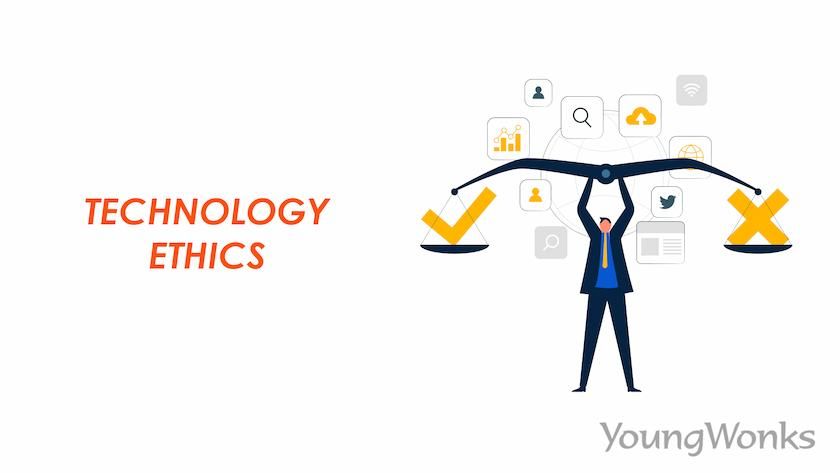Mar 04, 2024 By Team YoungWonks *
What is Technology Ethics?
Technology ethics goes beyond a mere consideration of individual actions; it encompasses the moral considerations that permeate the entire lifecycle of technology, from its development to its deployment and utilization. Its scope extends to the broader societal impact of technological advancements, encompassing issues such as socio-economic disparities, cultural implications, and environmental concerns.
What is the role of ethics in technology use?
In an era where technology seamlessly integrates into every facet of our lives, the ethical considerations surrounding its development and use are crucial. They serve as the bedrock for ensuring responsible, sustainable, and inclusive innovation. Balancing the accelerating pace of technological progress with ethical principles becomes vital not just for fostering public trust but also for addressing potential harms that may arise from unchecked innovation.
Historical Perspective
A glance back through history reveals instances where technological advancements presented society with ethical dilemmas. From the development of nuclear technology to the advent of bioengineering, understanding past ethical considerations provides insights into shaping contemporary technology ethics.
Examining historical contexts prompts us to reflect on how societal values and ethical frameworks have evolved in response to technological progress.
Cultural Variations
Recognizing that cultural values play a pivotal role in shaping perspectives on technology ethics is crucial. What may be deemed acceptable in one culture may be perceived differently elsewhere.
Examples abound, such as variations in global perspectives on privacy and data protection. Understanding and respecting this cultural diversity is integral to developing a technology ethics framework that resonates universally.
What are the important ethical considerations in technology?
The following are some of the key ethical considerations in technology:
Privacy Concerns
The omnipresence of data collection and surveillance technologies has brought forth poignant questions about the preservation of individual privacy in the digital age. Real-world examples, such as the widespread use of facial recognition technology in public spaces, underscore the urgency of addressing privacy concerns. The ongoing debate on the ethical considerations of monitoring personal data for targeted advertising adds nuance to the discussion. Exploring innovative solutions, such as the potential role of blockchain technology in enhancing privacy during data transactions, opens avenues for further examination.
Bias in Artificial Intelligence
As artificial intelligence (AI) becomes increasingly integrated into decision-making processes, concerns about inadvertent bias in AI algorithms come to the forefront. Concrete examples, like biased AI in hiring processes leading to discrimination and racially skewed facial recognition systems, emphasize the urgency of mitigating bias. Delving into how machine learning models can be trained to recognize and eliminate bias is an imperative step in ensuring fairness and equity in AI applications. The intersection of technology and ethics necessitates interdisciplinary collaboration between technologists and ethicists to forge effective solutions.
Automation and Job Displacement
The rising tide of automation brings with it challenges related to job displacement and the potential exacerbation of economic inequalities. Examining real-world scenarios, such as automation in manufacturing leading to job loss, provides tangible insights into the ethical considerations of implementing AI in customer service roles. Addressing these challenges requires not only societal adaptation but also the formulation of ethical frameworks that guide the responsible implementation of automation. Special attention to the ethical implications of automation in developing economies is crucial for ensuring inclusive and equitable technological progress.
Environmental Impact
The production and disposal of technology contribute significantly to environmental degradation, sparking ethical concerns about sustainability. Tangible examples, like the mounting electronic waste from outdated devices and the carbon footprint of data centers, highlight the environmental impact of technology. The exploration of how circular economy principles can be seamlessly integrated into the design and lifecycle of technology products presents a proactive approach to addressing these concerns. Engaging consumers in discussions about sustainable technology consumption forms an integral part of the broader ethical conversation.
What is the role of stakeholders in Technology Ethics?
Here is the role of a few stakeholders in Technology Ethics:
Government Regulations
- Governments play a pivotal role in shaping ethical standards and regulations for the tech industry.
- Examining real-world implementations, such as the General Data Protection Regulation (GDPR) in Europe and regulations on the use of facial recognition technology in public spaces, provides valuable insights.
- Balancing the imperative for innovation with the need to protect the public interest necessitates ongoing discussions on refining and adapting regulatory frameworks.
- The prospect of international collaboration to create a unified set of technology ethics standards prompts contemplation on the global dimension of technology ethics.
Corporate Responsibility
- Tech companies find themselves under increasing scrutiny for their ethical practices, demanding a reevaluation of corporate responsibilities.
- Real-world instances, such as Google's ethical considerations in AI development and Apple's commitment to environmental sustainability, underscore the evolving role of corporations in the ethical landscape.
- Consideration of steps that businesses can take to prioritize ethical considerations in their operations and products involves a multifaceted approach encompassing transparency, accountability, and proactive ethical decision-making.
- The integration of corporate social responsibility into the very fabric of tech companies emerges as a crucial element for aligning business goals with societal well-being.
User Awareness and Empowerment
- Empowering users to make informed choices about the ethical implications of technology is fundamental.
- Real-world implementations, such as privacy settings in social media platforms and transparent data collection policies, highlight the role of user awareness.
- Exploring innovative approaches, such as gamification, to make ethical considerations more accessible to the general public presents an intriguing avenue for fostering engagement.
- The continuous enhancement of public awareness forms a cornerstone for ensuring active user participation in ethical decision-making.
Ethical Dilemmas in Emerging Technologies
The following are some of the complex challenges and moral considerations that arise as new technologies develop:
Genetic Editing
- Emerging technologies, such as CRISPR, bring forth ethical questions regarding the potential for designer babies and genetic enhancements.
- Concrete examples, like the ongoing ethical debate on editing the human germline and creating genetically modified organisms, shed light on the intricacies of genetic editing.
- Delving into the establishment of ethical guidelines that govern the use of genetic editing technologies necessitates a nuanced understanding of the societal, ethical, and scientific considerations.
- International collaboration emerges as a key theme in ensuring a consistent global approach to the ethical use of genetic editing.
Autonomous Vehicles
- The development of self-driving cars introduces ethical dilemmas concerning decision-making in life-and-death situations.
- Real-world examples, such as programming ethical decisions into autonomous vehicles and the potential for accidents caused by algorithmic errors, present tangible challenges.
- The exploration of ethical frameworks for AI in situations where human lives are at stake requires a multidisciplinary approach involving technologists, ethicists, policymakers, and the general public.
- The inclusion of public discourse and participation becomes crucial in shaping the ethical considerations of autonomous vehicles in a way that reflects societal values.
Brain-Computer Interfaces
- The convergence of technology and neuroscience presents ethical challenges related to privacy and cognitive autonomy.
- Tangible examples, such as the ethical considerations of accessing and sharing neural data and potential risks to mental privacy, illuminate the complex landscape of brain-computer interfaces.
- Delving into the establishment of ethical safeguards for the development and use of brain-computer interfaces involves a careful balancing act between technological innovation and ethical principles.
- Ensuring that brain-computer interfaces are developed and used for the benefit of individuals without compromising their autonomy emerges as a critical consideration in this evolving field.
Conclusion
In the rapidly evolving landscape of technology, ethical considerations stand as the linchpin for ensuring that innovation aligns with societal values and principles. As we navigate this intricate terrain, addressing privacy concerns, combating bias, and promoting responsible governance will be essential. By fostering a collective commitment to technology ethics, we can harness the power of innovation while safeguarding the well-being of individuals and society as a whole. The questions raised throughout this comprehensive exploration serve as more than mere starting points; they invite a continuous dialogue that evolves with the ever-changing technological landscape, shaping a more ethical technological future that resonates with the values of humanity.
Empower the Next Generation of Ethical Technologists with YoungWonks Coding Classes
In the rapidly evolving world of technology, it is imperative for future generations to develop a strong ethical foundation in technology use and creation. At YoungWonks, our commitment to nurturing this essential aspect of technology education shines through our comprehensive Coding Classes for Kids, where we emphasize not only on the technical skills involved in coding but also on the ethical considerations that come with technological advancements. Our specialized Python Coding Classes for Kids and our programs focusing on Raspberry Pi, Arduino, and Game Development Coding Classes are meticulously designed to foster a sense of responsibility, creativity, and critical thinking among young learners, ensuring they are well-equipped to become the ethical technology leaders of tomorrow.
Frequently asked questions related to Technology Ethics
This section answers some of the frequently asked questions related to Technology Ethics.
Why is technology ethics important?
Technology ethics is crucial for ensuring responsible and sustainable innovation. It helps prevent unintended consequences, protects individual rights, and fosters trust in the evolving digital landscape.
How does technology impact privacy?
Technology can impact privacy through extensive data collection, surveillance, and the use of advanced algorithms. Privacy concerns arise from issues such as facial recognition, data breaches, and targeted advertising.
What is bias in artificial intelligence (AI)?
Bias in AI refers to the presence of unfair and discriminatory outcomes in algorithms. It can arise from biased training data or inherent biases in the design process, leading to unequal treatment and outcomes for different groups.
How can we address bias in AI?
Addressing bias in AI involves implementing fair and transparent algorithms, diversifying the teams developing AI systems, and continuously monitoring and refining models to ensure equity in outcomes.
What are the ethical considerations of automation?
Ethical considerations of automation include job displacement, economic inequality, and the impact on societal well-being. Balancing the benefits of automation with ethical frameworks is essential to mitigate potential harms.
How does technology contribute to environmental degradation?
The production, usage, and disposal of technology contribute to environmental degradation through electronic waste, energy consumption, and resource depletion. Sustainable practices and circular economy principles are crucial to minimize this impact.
What role do governments play in technology ethics?
Governments play a pivotal role in setting ethical standards and regulations for the tech industry. They address issues such as data protection, privacy, and responsible AI development to ensure the public interest is safeguarded.
How can businesses prioritize technology ethics?
Businesses can prioritize technology ethics by integrating ethical considerations into their operations, fostering transparency, investing in responsible technology development, and actively engaging with stakeholders to address concerns.
What is the future of technology ethics?
The future of technology ethics involves ongoing dialogues, international collaborations, and continuous advancements in ethical frameworks. As technology evolves, the ethical landscape will adapt to address emerging challenges and opportunities.
*Contributors: Written by Sai Sandesh; Edited by Rohit Budania; Lead image by Shivendra Singh

